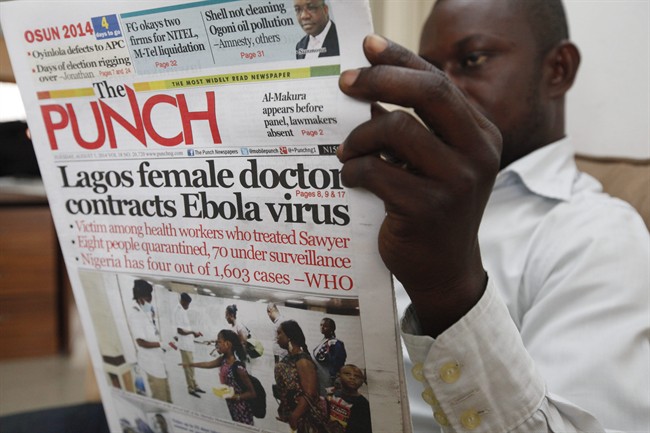TORONTO – Her days are long and intense from Kailahun, Sierra Leone, but Canadian Sharla Bonneville says she knows she’s dedicating her time to a historical cause.

The Médecins Sans Frontières logistician is on the ground in West Africa for the next two months. The MSF group follows the news closely – Bonneville notes that there’s concern of the Ebola outbreak spreading outside of the region.
“For us, the reality is it’s here right now, and everyday we’re dealing with the outbreak,” she told Global News.
The experience has been surreal.
“I still can’t really grasp what I see happening in the clinic and really fully connect it to the virus. To see the level of suffering with the patients and how they arrive at the clinic and how quickly and deadly this disease is,” she explained.
READ MORE: How Canadian docs are fighting Ebola during the world’s worst outbreak

Get weekly health news
Ebola is among the world’s most virulent diseases, and by Wednesday, the death toll rose to at least 932 people across four West African countries – Sierra Leone, Guinea, Liberia and Nigeria.
There have now been at least 1,711 cases of Ebola this year, which has no proven vaccine or treatment, according to new figures released by the World Health Organization.
The global health authority is still pointing to high “community resistance.” Canadian missionaries on the frontlines have already shared their stories of an uphill climb in convincing local villages that they’re there for the right reasons.
READ MORE: Why health officials say the Ebola epidemic won’t spread into Canada
Some villages threw rocks at aid workers’ vehicles, others shut them out completely. MSF doctor Marc Forget had been told that it’s these NGOs that are bringing in the vicious disease.
“Before you guys came, we didn’t have it so you created this problem,” Forget says he was told.
“It’s hostile…when that happens, it means people don’t want us to be there, they don’t understand what we’re doing and they care for their own family members and they’ll get contaminated in doing that,” he told Global News.
Earlier this month, Dr. Tim Jagatic – also with the MSF mission – said his team of doctors and nurses had been chased out of villages. Their advice to stay away from deceased victims’ bodies is brushed aside and the survivors they’re curing are stigmatized by their community.
READ MORE: Doctor with Ebola gives experimental serum to infected colleague
They’re convinced that witchcraft or government conspiracy is at play.
“These types of ideas come forth before basic public health ideas,” Jagatic told Global News.
Both Jagatic and Forget are back in Canada but are slated to return to the region in the coming months.
Perhaps the tides are turning in different communities, though. Bonneville hasn’t faced any backlash so far and she thinks word of mouth may be helping.
READ MORE: 5 things to know about the experimental Ebola drug
The survival rate for patients they’re taking sits at about 40 per cent. Survivors return to their neighbourhood and talk about the care they received.
“People don’t know what it’s like inside and they think other things are going on so everytime we have discharges, they say ‘I was taken care of, I was cleaned, I had good food,’” Bonneville explained.
Now, several chiefs are proactively seeking out sick patients to send to the clinic. It’s operating at full capacity.
READ MORE: What you need to know about Ebola
Bonneville says that in the past, outbreaks have been contained within three months. It’s evident this isn’t the case here.
“We’re setting a new path. There’s nothing to follow at this point, there’s nothing that was done to this extent and size,” Bonneville said.
“It’s making history in a way.”
– With files from the Associated Press
carmen.chai@globalnews.ca
Follow @Carmen_Chai





Comments